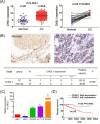CHI3L1 promotes proliferation and improves sensitivity to cetuximab in colon cancer cells by down-regulating p53
- PMID: 31536166
- PMCID: PMC6977395
- DOI: 10.1002/jcla.23026
CHI3L1 promotes proliferation and improves sensitivity to cetuximab in colon cancer cells by down-regulating p53
Abstract
Background: Chitinase 3-like protein 1 (CHI3L1) is most likely a malignant tumor metastasis-associated gene. However, the functions of CHI3L1 in colon cancer cell proliferation and its cetuximab sensitivity are still unclear. We aimed to investigate the mechanism of CHI3L1 in promoting colon cancer cell proliferation and its sensitivity to cetuximab.
Methods: The expression of CHI3L1 in colon cancer and adjacent tissues were detected by immunohistochemistry. CHI3L1 was overexpressed in colon cancer cell lines by lentiviral technology. Cell proliferation and sensitivity to cetuximab were measured by MTT assay, cell cycle was analyzed by flow cytometry, and expression of cell cycle-related proteins was analyzed by immunoblotting.
Results: The results showed that the level of CHI3L1 in colon cancer tissue was significantly higher than that in adjacent tissue, which was also correlated with overall survival. The cell proliferation rate was significantly increased after overexpression of CHI3L1, and the sensitivity to cetuximab was significantly increased. The expression of p53 was down-regulated while the EGFR was up-regulated significantly in CHI3L1 overexpressed cells. When rescued the expression of p53 in HCT116-CHI3L1 cells, the cell proliferation and sensitivity to cetuximab could be restored.
Conclusion: High levels of CHI3L1 are associated with poor prognosis and accelerate the proliferation of colon cancer cells and increase the sensitivity to cetuximab. Its mechanism of increasing the cell proliferation and sensitivity to cetuximab may be explained by down-regulating p53 expression and then, up-regulating the expression of EGFR.
Keywords: CHI3L1; cetuximab; colon cancer; p53; proliferation.
© 2019 The Authors. Journal of Clinical Laboratory Analysis published by Wiley Periodicals, Inc.
Figures




References
-
- Siegel RL, Miller KD, Jemal A. Cancer statistics, 2018. CA Cancer J Clin. 2018;68:7‐30. - PubMed
-
- Chen W, Zheng R, Peter D, et al. Cancer statistics in China, 2015. CA Cancer J Clin. 2016;66(2):115‐132. - PubMed
-
- Eadens MJ, Grothey A. Curable metastatic colorectal cancer. Curr Oncol Rep. 2011;13:168‐176. - PubMed
-
- Van Cutsem E, Nordlinger B, Adam R, et al. Towards a pan‐European consensus on the treatment of patients with colorectal liver metastases. Eur J Cancer. 2006;42:2212‐2221. - PubMed
-
- Alberts SR, Horvath WL, Sternfeld WC, et al. Oxaliplatin, fluorouracil, and leucovorin for patients with unresectable liver‐only metastases from colorectal cancer: a north central cancer treatment group phase II study. J Clin Oncol. 2005;23:9243‐9249. - PubMed
MeSH terms
Substances
Grants and funding
LinkOut - more resources
Full Text Sources
Research Materials
Miscellaneous

